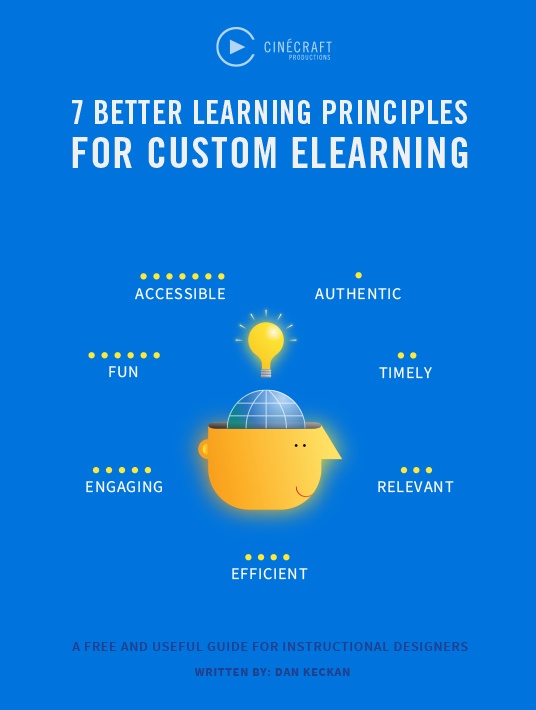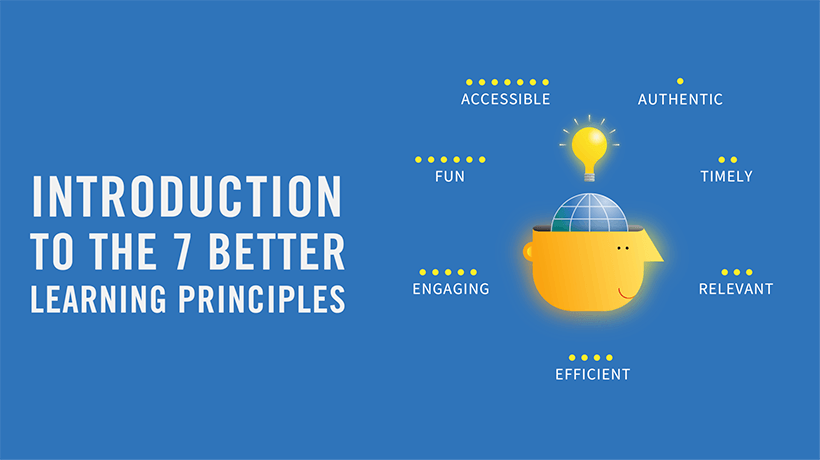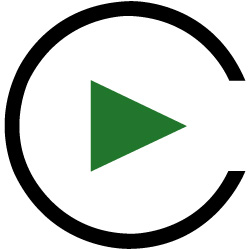7 Learning Principles Based On 20 Years Of Experience
There is a large contingent of Instructional Designers out there who are forced by their organization's lines of business to “design” eLearning courses. Stakeholders ask these well-intentioned Instructional Designers to become order-takers and apply learning objectives, knowledge checks and assessments to their PowerPoints and import them into a Storyline or Captivate published SCORM file. Once it is loaded into the organization’s LMS it resides there in a deep blue abyss forever. Did I mention that these projects have a completion deadline of 2-3 weeks? Does this sound like you? It’s not your fault. Let me say it again, it’s not your fault! After all, you have a backlog of projects and only so many hours in a day to argue the merits of learner-centric and performance-focused eLearning.

In 2014, a team of well-educated and experienced learning professionals got together to create the "Serious eLearning Manifesto" [1].
They were frustrated with bad eLearning that fails to live up to its promise of improving performance and creating measurable results. So, they decided to come up with a set of 22 principles that reflect effective performance-focused eLearning, which Instructional Designers should know and use. I’m a signatory and agree with every principle in the manifesto. However, it falls short of being a useful tool that Instructional Designers can use to evaluate their design throughout the project lifecycle and make changes for the better. There are other tools out there that evaluate the quality of Instructional Design based on performance-focused and learner-centric standards. Take the Quality Matters Rubric, for instance. This tool is very advanced, has quality assurance standards, certification for designers, and even membership opportunities. However, it focuses primarily on academia—not industry, it is very rigorous, and it can take almost as much time to evaluate your course as building the actual course. Therefore, I decided to come up with an evaluation tool for my team, and I would like to share it with you.
The evaluation tool is called the 7 Better Learning Principles assessment (of course, if someone comes up with a better name, I’m all ears).
These 7 principles are based on 20 years of designing and reviewing effective and, unfortunately, ineffective courses. They are also based on other people’s research and experience. I would argue that cognitive apprenticeship is a more effective teaching technique than most other approaches [2]. The technique draws on the theory that a more knowledgeable person engages in a task with a more novice person by describing their own thoughts as they work on a task. Here they provide modeling of behaviors, coaching, scaffolding (where the teacher enables the student to perform the task by gradually shredding away assistance), articulation, reflection, and finally exploration. Cognitive apprenticeship is not always a cost-effective or timely solution. Just imagine, a machine shop supervisor with a single compound die press is tasked with training a team of six new employees that work three different shifts on two different machines. The math for timely or cost-effective training just doesn’t work, does it? Therefore, a more sustainable, timely and consistent approach is the benefit of applying the 7 Better Learning Principles to custom eLearning courses. These principles have attributes that are defined by their effectiveness in learning.
7 Better Learning Principles And Their Key Performance-Focused Attributes
- Authentic
Design is genuine, real, life-like, accurate and offers an opportunity for reflection and exploration. - Timely
Convenient, made available at a favorable or useful time. - Relevant
Learning is closely connected to business needs and learning objectives. - Efficient
Content is streamlined, well organized, and minimizes learners' effort. - Engaging
Create learning that activates learners’ curiosity, rather than providing meaningless clicks. - Fun
Delivery is entertaining, amusing, and enjoyable. - Accessible
Content is easy to understand without obstacles and is attainable.
In future articles, I will take a deeper dive into each of these principles and their attributes, and provide examples of compliance as well as noncompliance.
My goal is to try and quantify and provide better feedback to you; and, provide a tool you can use with your stakeholders, to hopefully give merit to the argument for better learning on their next project. Please do download our eBook: "7 Better Learning Principles For Custom eLearning" to truly optimize your custom eLearning processes. You can also watch the supporting webinar "Maximize Learning Effectiveness Using The 7 Better Learning Principles" and unlock the full potential of performance-based learning.
References:
[1] Serious eLearning Manifesto
[2] Collins, A., Brown, J. S., & Newman, S. E. (1987). Cognitive apprenticeship: Teaching the craft of reading, writing and mathematics (Technical Report No. 403). BBN Laboratories, Cambridge, MA. Centre for the Study of Reading, University of Illinois. January, 1987.


